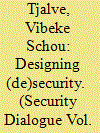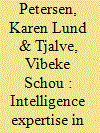| Srl | Item |
| 1 |
ID:
109595


|
|
|
|
|
| Publication |
2011.
|
| Summary/Abstract |
This article pursues three interrelated objectives. Above all, it seeks to theorize desecuritization at the level of polity rather than policy; to distinguish between forms of political order and the likelihood that they will give in to the call for exceptional measures. Second, and to achieve that goal, it suggests a turn away from continental notions of 'the people' and towards American debates over 'the public sphere': a realm deliberately designed and continually cultivated to exercise autonomous, pluralistic and politicized contestation. Third, it examines why the 'speechlessness' of contemporary Western security practices may inhibit that public sphere from functioning properly.
|
|
|
|
|
|
|
|
|
|
|
|
|
|
|
|
| 2 |
ID:
164181


|
|
|
|
|
| Summary/Abstract |
The emergence of a more elusive and uncertain threat environment has transformed the nature of intelligence, increasing its reliance on civil society partners. Once the work of an insular and carefully select few, intelligence production is now a networked, partially open and extensively public–private enterprise. Most poignantly, new practices of public–private ‘collection’ face Western intelligence services with novel questions about control and accountability – questions to which the services have responded with hopes that by standardizing ‘methodologies’, central command may be retained. Suggesting a more complex picture, this article argues that ‘managing uncertainty’ imply forms of interpretation and choices which cannot be pre-empted by rule-regulation: more than Weber’s ideal of the procedural and rule-bound, it may be his (once central, yet largely marginalized) emphasis on institutional and individual capacities for critical ‘judgment’ that is of relevance today.
|
|
|
|
|
|
|
|
|
|
|
|
|
|
|
|